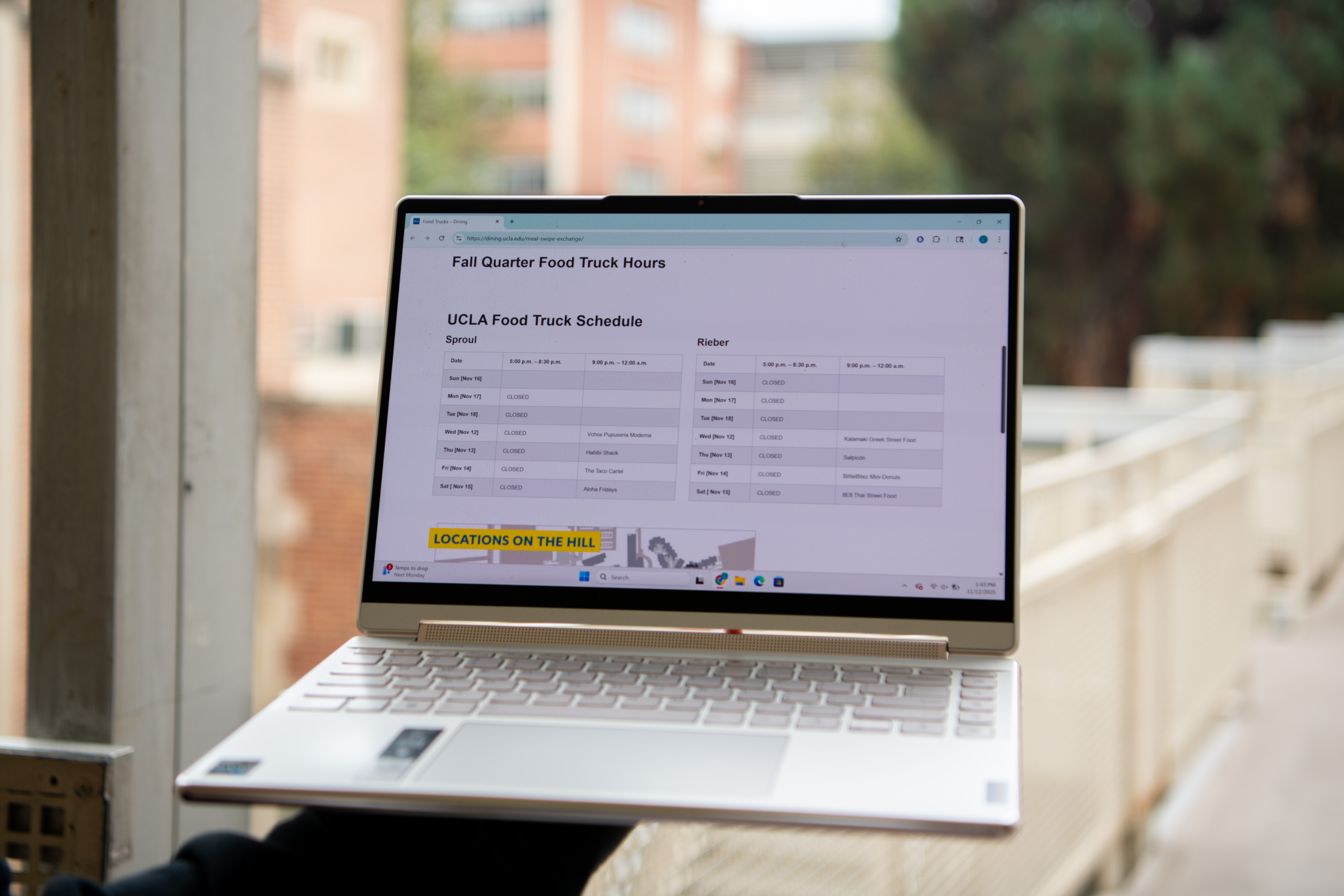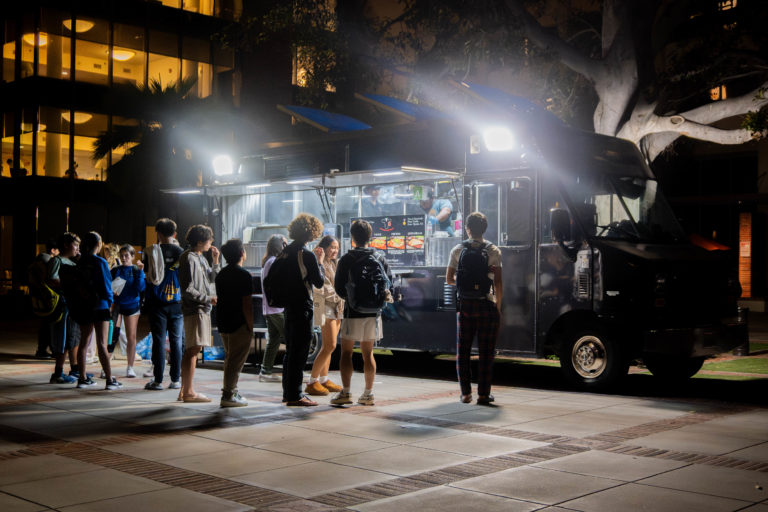UCLA Dining is reducing the number of food trucks it offers on the Hill, sparking criticism from food truck vendors and students.
UCLA Dining said in an emailed statement that it is limiting third-party food vendors on the Hill to maintain a “student-centered” dining system. Food trucks were originally brought on campus to address staffing shortages during the COVID-19 pandemic, but UCLA Dining is reducing the trucks now that the dining halls have reached “improved staffing levels,” it added.
UCLA is focusing to improve operations in its residential dining halls, including extending hours, according to the statement.
“This decision aligns with the program’s original purpose; to maintain a sustainable, student-centered dining system that focuses on the Hill’s residential restaurants,” UCLA Housing said in the emailed statement.
 UCLA Dining’s food truck schedule is pictured. Food trucks were originally brought on campus to address staffing shortages during the COVID-19 pandemic. (Joice Ngo/Daily Bruin)
UCLA Dining’s food truck schedule is pictured. Food trucks were originally brought on campus to address staffing shortages during the COVID-19 pandemic. (Joice Ngo/Daily Bruin)
Clare Garcia, the director of external communications for the On-Campus Housing Council, said UCLA Dining told OCHC staff that the food trucks will only come to campus during late night meal periods – which last from 9 p.m. to 12 a.m. – from Monday through Saturday. On Sundays, food trucks will come to campus during both the regular dinner period – which is from 5 p.m. to 8:30 p.m. – and late night periods, said Garcia, a second-year psychology student.
The week of Nov. 17, food trucks were available for dinner and late night hours on Sunday, according to UCLA Dining’s website. They are only available for late night options Nov. 19, Nov. 20, Nov. 21 and Nov. 22.
The food trucks were listed as options for dinner and late night hours Monday and Tuesday, which coincided with a strike led by dining hall workers that led to the closure of all dining halls except for De Neve Residential restaurant, Epicuria at Covel and Feast at Rieber.
Food truck presence on campus peaked in fall 2023, when up to six food trucks served the Hill residents during dinner meal periods, according to a Daily Bruin data analysis. However, that number has since dropped to about two food trucks per meal period, according to the analysis.
[Related: Beyond the Dining Hall: A Data-Driven Look at UCLA’s Food Trucks]
Garcia said UCLA Dining told OCHC staff that it plans to “phase out” food trucks.
“We have late night food trucks for right now, but at a certain point in the next coming year, we’re not going to have any food trucks whatsoever,” she said.
The food truck reduction follows UCLA Housing’s recent decision to no longer accept meal swipes at non-ASUCLA restaurants – including Carl’s Jr., Panda Express and Veggie Grill. UCLA Housing said in a July 24 emailed statement that it would expand residential restaurant hours and offerings in line with the change and increase the value of meal swipes at ASUCLA-run restaurants from $9 to $10.
[Related: Non-ASUCLA restaurants to stop accepting meal swipes starting fall 2025]
Luis Galvan, the owner of Perro 1-10 Tacos – a food truck that has served food on the Hill since 2023 – said the food truck has come to campus less. He added that communication from UCLA Dining on time slots has been limited.
“We hardly get any updates,” Galvan said. “They just send emails with the shifts, and that’s about it.”
Another food truck owner, who was granted anonymity due to fear of UCLA cutting their food truck for speaking out, said their truck often visited UCLA multiple times each week, but now appears once a week if it is “lucky,” the owner said.
They added that lunch and dinner spots have been reduced, which means that more vendors are competing for a number of late-night slots.
The owner said last-minute scheduling from UCLA Dining has made it difficult to operate as a food truck that typically plans months ahead. They added that UCLA Dining often only confirms shifts about a week in advance, meaning they must hold many dates open that frequently go unused.
“Fourteen or 15 time slots I would give them in hopes of getting just for two or three shifts, only to end up getting one,” the owner said.
Luna Liang, a first-year bioengineering student, said the trucks are an important part of campus dining. She said the food trucks bring diversity to UCLA’s dining options, adding that they contribute to the university’s reputation of having strong dining options. Niche has ranked UCLA as the best college in America for food for 7 years in a row.
“As the number one dining hall, the school should be providing the diverse dining options that the food trucks provide,” Liang said.
Nathaniel Tran, a third-year anthropology student, said he often goes to food trucks to try new types of food. He added that dining hall food alone can sometimes get monotonous.
Tran said he enjoys the food trucks’ late night options after club meetings.
“I come back starving, and extended dinner is something that’s nice,” he said.
The wait times for certain residential restaurants, such as The Study at Hedrick, are about 30 to 40 minutes at night, Tran said.
Liang said she believes the reduction in food trucks will negatively impact students by giving them fewer options and increasing demand in overcrowded dining halls.
“We want the food trucks back,” Liang said. “Don’t take them away.”


Dining and Cooking